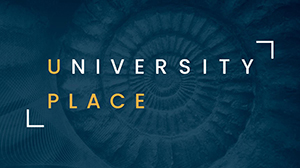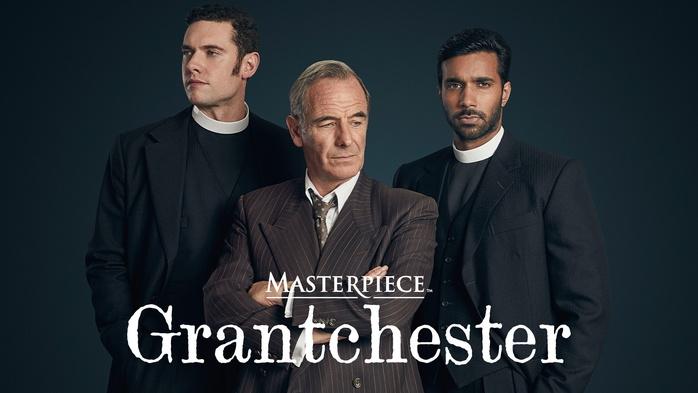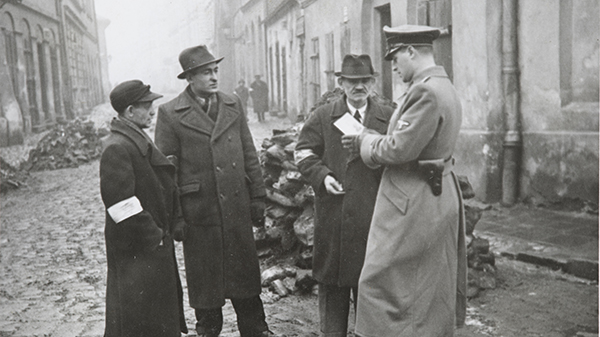SCHEDULE UPDATE: ‘The U.S. and the Holocaust’ premieres Sunday, Sept. 18
September 7, 2022 Leave a Comment
The U.S. and the Holocaust, a new three-part documentary directed and produced by Ken Burns, Lynn Novick and Sarah Botstein, explores America’s response to one of the greatest humanitarian crises in history.
Due to the coverage of the funeral of Queen Elizabeth II on Monday, Sept. 19, PBS has adjusted the air dates for The U.S. and the Holocaust. The premiere date for this program will remain the same: 7 p.m. Central Time (CT) Sunday, Sept. 18 on PBS Wisconsin.
Episode two will now air at 7 p.m. CT Tuesday, Sept. 20, followed by episode three at 7 p.m. CT Wednesday, Sept. 21. The entire series will still be available for streaming on Sunday, Sept. 18 on the PBS Video App.
An encore of episode one will follow the BBC programming on Monday, Sept. 19.
Inspired in part by the United States Holocaust Memorial Museum’s “Americans and the Holocaust” exhibition and supported by its historical resources, the film examines the rise of Hitler and Nazism in Germany in the context of global antisemitism and racism, the eugenics movement in the U.S. and race laws in the American south. The series, written by Geoffrey Ward, sheds light on what the U.S. government and American people knew and did as the catastrophe unfolded in Europe.
Combining the first-person accounts of Holocaust witnesses and survivors and interviews with leading historians and writers, The U.S. and the Holocaust dispels competing myths that Americans either were ignorant of the unspeakable persecution that Jews and other targeted minorities faced in Europe or that they looked on with callous indifference. The film tackles a range of questions that remain essential to our society today, including how racism influences policies related to immigration and refugees as well as how governments and people respond to the rise of authoritarian states that manipulate history and facts to consolidate power.
“History cannot be looked at in isolation,” said Ken Burns. “While we rightly celebrate American ideals of democracy and our history as a nation of immigrants, we must also grapple with the fact that American institutions and policies, like segregation and the brutal treatment of Indigenous populations, were influential in Hitler’s Germany. And it cannot be denied that, although we accepted more refugees than any other sovereign nation, America could have done so much more to help the millions of desperate people fleeing Nazi persecution.”
“Exploring this history and putting the pieces together of what we knew and what we did has been a revelation,” said Lynn Novick. “During the Second World War, millions of Americans fought and sacrificed to defeat fascism, but even after we began to understand the scope and scale of what was happening to the Jewish people of Europe, our response was inadequate and deeply flawed. This is a story with enormous relevance today as we are still dealing with questions about immigration, refugees and who should be welcomed into the United States.”
“At the center of our narrative is the moving and inspiring first-hand testimony of witnesses who were children in the 1930s,” said Sarah Botstein, a longtime producing partner of Burns and Novick who is making her directorial debut on this film. “They share wrenching memories of the persecution, violence and flight that they and their families experienced as they escaped Nazi Europe and somehow made it to America. Their survival attests to the truth of the remark made by journalist Dorothy Thompson that ‘for thousands and thousands of people a piece of paper with a stamp on it is the difference between life and death.’”
The U.S. and the Holocaust features a fascinating array of historical figures that includes Franklin D. Roosevelt, Charles Lindbergh, Dorothy Thompson, Rabbi Stephen Wise and Henry Ford, as well as Anne Frank and her family, who applied for but failed to obtain visas to the U.S. before they went into hiding. This unexpected aspect of the Franks’ story underscores an American connection to the Holocaust that will be new to many viewers.
The film also looks at American policy on topics ranging from Calvin Coolidge’s staunch anti-immigration ideology to FDR’s Lend-Lease bill and how these fights took shape on the home front, including the emergence of Nazi sympathizers. Some of America’s most well-known leaders, such as Lindbergh and Ford, were also among the most vocal antisemites. Similarly, new light is shed on many of the well-known controversies surrounding the American response to the Holocaust, including the dreadful story of the more than 900 Jewish refugees aboard the MS St. Louis, who were denied entry to Cuba and the U.S. in 1939 and forced to return to an uncertain fate in Europe, and the enduring debate over whether the Allies should have bombed Auschwitz.
Americans had heard about Nazi persecution on their radios and read about it in the press. Many responded by denouncing the Nazis, marching in protest and boycotting German goods. Individual Americans performed heroic acts to save individual Jews and stood up to Nazism at home and abroad. Some 200,000 Jews eventually found refuge in the U.S., but many more were denied entry. As the Nazi terror escalated, the U.S. responded by tightening, not opening, its borders to refugees. “If I had my way,” said Senator Robert Reynolds of North Carolina at the time, “I would today build a wall about the United States so high and so secure that not a single alien or foreign refugee from any country upon the face of this earth could possibly scale or ascend it.”
Ultimately, The U.S. and the Holocaust offers little consolation to those who believe that the challenges posed by nativism, antisemitism, xenophobia and racism are buried deeply and permanently in the past. “The institutions of our civilization [are] under tremendous stress,” warns writer Daniel Mendelsohn, who shares his family’s story in the film. “The fragility of civilized behavior is the one thing you really learn, because these people, who we now see in these sepia photographs, they’re no different from us. You look at your neighbors, the people at the dry cleaner, the waiters in the restaurant. That’s who these people were. Don’t kid yourself.”
 Passport
Passport






Dawn Jones says:
Will there be another showing of this series? If so when?
Alyssa Beno says:
Hello Dawn – PBS is bringing the docuseries back for broadcast in January 2023. The series is also available to watch on the free PBS Video App and online through Oct. 16, 2023 (this Sunday). https://pbswisconsin.org/watch/us-and-holocaust/
Claire Malchow says:
I, too, have not seen all the episodes. I will be watching on PBS. This makes me so sad and melancholy, as it relates to what is going on in our country at this time. I pray that we are not doomed to repeat the past due to lack of knowledge and not paying attention to our current events. Thank you so much, Ken Burns, and everyone associated with this series. I love history and especially that era.
Alyssa Beno says:
Hi Claire, just a reminder that the 3-part series is available to stream on the free PBS Video App or online until Oct. 16, 2022. https://pbswisconsin.org/watch/us-and-holocaust/
Scott Allan says:
I watched the first two parts would like to see the rest
Alyssa Beno says:
Hi Scott, you can watch the remaining episode on the free PBS Video App or stream it online here through Oct. 16. We hope you enjoyed the first two parts! https://pbswisconsin.org/watch/us-and-holocaust/
Carla Watson says:
Thank you so much for creating this important documentary.
After my students read the Diary of Anne Frank,
we visited the Tolerance Museum .
Dr. Peter I Berman says:
Even for those who have read deeply and studied the Holocaust in all of its complexities the Ken Burns programs present an astonishing array of nuances and understandings. An enormously impressive contribution that ought be watched and rewatched by everyone. Especially revealing is how the Germans were acutely conscious of how the US mistreated our Black citizens and used that mistreatment as a template for mistreating their Jews. And then raised the stakes destroying an entire subset of German citizens.
Perry says:
I find it necessary to point out an oversight in the first episode and possibly the remaining episodes of this undoubtedly great series. I saw at certain times that a comment would be made by your narrator or one of your historians how “we” as a nation of American citizens did not want to allow the Jews into the United States. The “we” that was mentioned in your first episode or a variation of that particular word truly did not reflect the overall thoughts of the population at large. Simply because “we” as black people and other minorities had no say so in the social fabric or in the political system with any real influence during that time. With the exception of a few standout, minorities were relegated to the status of second class, and also lower groups of people. I wish that your beautiful production had made it necessary to mention the fact that “white Americans” as a whole were the guilty ones who did not want the Jews to enter into the United States during the Nazi occupation of Germany. The truth is the light.
Dr Peter I Berman says:
Since 1776 white Americans have been guiding American history. At least until the Civil War after which with some adjustments continued their “guiding” of US policy. Lets not forget returning Tuskegee Airmen returning from Europe to their US airbase were refused entry into the Officers Club. Even though German POW officers were occasionally seen eating there.
We don’t really know how different were the attitudes of our Black communities in the 1920’s, 1930’s and 1940’s vis a vis the white communities on the topic of anti-Semitism.
It’s likely since anti-Semitism was so deeply ingrained in US civil society and even our military that the differences were modest. Lets not forget the essential point. Taken as a whole US civil society in the 1920’s to 1940’s was anti-Semitic to a degree we find repugnant today.
Rob Moll says:
Hello , I agree w Mr Goldman, I really enjoy everything that Ken Burns production is televising ! He’s a gift and a treasure! I love history , esp WW Two , for my Father returned home from It , after serving in the US Army ! When I inquired about it , as a young child , his reply was always it’s not like on TV ! Thank you so much !
Cristi Cave says:
We will unavoidably have to miss the first episode, airing on Sep 18th, and maybe the second one as well, depending on how things go. We’re very sad about this. Can it be true that this important film will only be shown once, never to be seen again?
Alyssa Beno says:
Hello Cristi – there will be back-to-back showings of each episode. Episode 1 will premiere 7 p.m. Sunday, Sept. 18 with an encore at 9:12 p.m. Episode 1 will repeat again following coverage of the Queen’s funeral highlights (scheduled for 7 p.m.) on Monday, Sept. 19. And then on Tuesday, Sept. 20, we will air episode 2 at 7 p.m. followed by a repeat of that episode beginning at 9:22 p.m. Finally, with episode 3, we will air it 7 p.m. Wednesday, Sept. 21. followed by a repeat of that episode beginning at 9:15 p.m.
All three episodes of ‘The U.S. and the Holocaust’ will be available to stream on the free PBS Video App beginning Sunday, Sept. 18. You can download the free app here and watch the program on your Smart TV and streaming devices. https://www.pbs.org/pbs-video-app/. Please let me know if you have further questions!
Fran Head says:
Thank you for the update. Is that 7PM east or west coast time…I am in Oregon.
Alyssa Beno says:
Central time.
H M says:
How long will the 3 episodes of the “US and the Holocaust” be available to watch on pbs.org?? There is no mention of the expiration date anywhere. Every other show on PBS has an expiration date. I don’t have a TV right now & would like to watch it before it becomes unavailable. Why is this information such a mystery? What is really going on here?
Alyssa Beno says:
‘The U.S. and the Holocaust’ is available to stream on pbswisconsin.org and the free PBS Video App until Oct. 16, 2022. There will likely be another broadcast of the series in January 2023. In the meantime, stream it here: https://pbswisconsin.org/watch/us-and-holocaust/
Arnold Goldman says:
I will be watching this documentary when it is aired. Not only am I a huge Ken Burns fan but I really appreciate him looking into what happened in the past, especially as it relates to anti-Semitism, fear of immigrants, and threats we face today of authoritarian governments, even in our own country.
Alyssa Beno says:
Hi Arnold – we’re so glad to hear you’re looking forward to ‘The U.S. and the Holocaust.’ Please take note of the schedule change that was just posted at the top of the article. The three-part series will now air 7 p.m. Sunday, Sept. 18; 7 p.m. Tuesday, Sept. 20; and 7 p.m. Wednesday, Sept. 21 to accommodate coverage of the funeral of Queen Elizabeth II on Monday, Sept. 19.